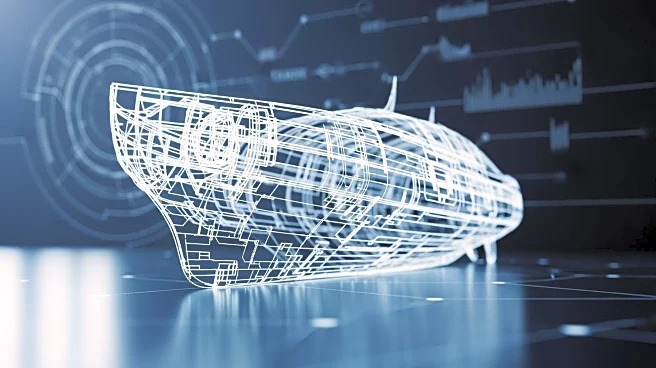What's Happening?
Japan is set to sign a memorandum with the United States to enhance cooperation in the shipbuilding sector. This agreement, expected to be signed on October 27 during President Trump's visit to Japan,
aims to detail investments in shipbuilding as part of ongoing trade talks. Japan has committed to a $550 billion investment in the U.S., with shipbuilding being a key component. The memorandum will establish a Japan-U.S. shipbuilding working group to focus on making shipbuilders more efficient and competitive. This includes standardizing ship design and parts, and potentially having Japan design parts for production in the U.S. The cooperation will also explore the use of AI to improve ship design and functionality. Japan's shipbuilding industry, although having lost market share over the past two decades, remains the world's third-largest and is receiving government support for technological advancements.
Why It's Important?
This memorandum signifies a strategic partnership between Japan and the U.S. in the shipbuilding industry, which is crucial for both economic and defense sectors. By collaborating, both nations aim to counter China's dominance in global shipbuilding. The agreement could lead to increased efficiency and competitiveness for U.S. and Japanese shipbuilders, potentially boosting their market share. For the U.S., this partnership aligns with its strategy to enhance local repair capabilities for its Navy vessels, especially those deployed in the Asia-Pacific region. For Japan, the collaboration offers an opportunity to revitalize its shipbuilding industry through technological innovation and increased investment, which could have significant economic benefits.
What's Next?
Following the signing of the memorandum, the Japan-U.S. shipbuilding working group will begin its efforts to implement the agreed-upon strategies. This includes exploring the standardization of ship designs and parts, and the integration of AI technologies. Both governments are likely to monitor the progress closely, with potential adjustments to policies and investments based on the outcomes. The collaboration may also prompt reactions from other global shipbuilding players, particularly China, as they assess the impact on their market positions.
Beyond the Headlines
The agreement could have broader implications for international trade and defense alliances. By strengthening ties in shipbuilding, Japan and the U.S. are reinforcing their strategic partnership, which could influence geopolitical dynamics in the Asia-Pacific region. The focus on AI and technological advancements in shipbuilding also highlights the increasing importance of innovation in maintaining competitive advantages in traditional industries.









